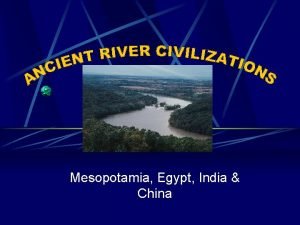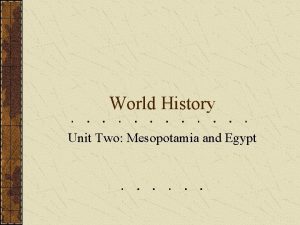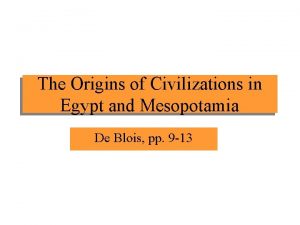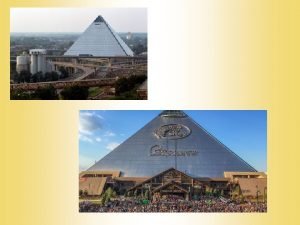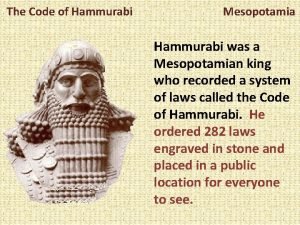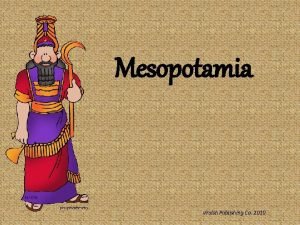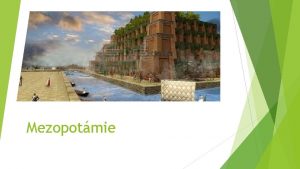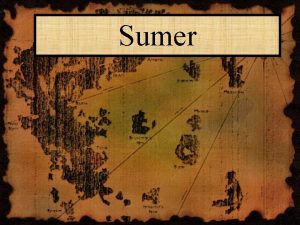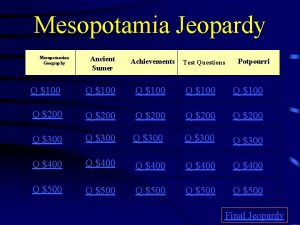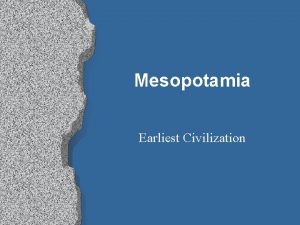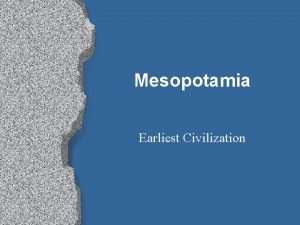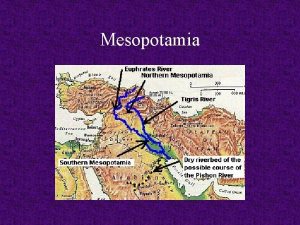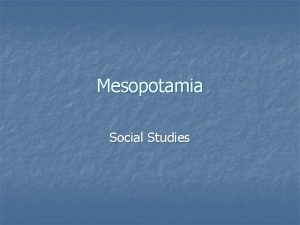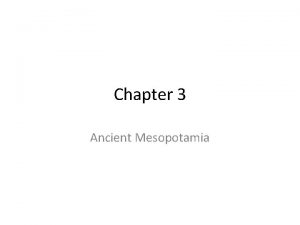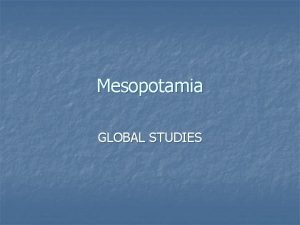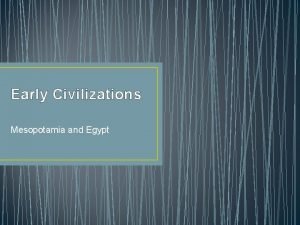812 How Was Egypt SimilarDifferent to Mesopotamia Do












- Slides: 12

8/12: How Was Egypt Similar/Different to Mesopotamia? Do Now: Study the Map of Ancient Egypt then answer the questions on your handout. Arabian Desert The Nile River Nubian Desert Libyan Desert


Ancient Egypt - Geogrpahy • The Civilization of Ancient Egypt developed around the Nile River over 5000 yrs ago. • The Nile River is surrounded by the Libyan and the Nubian desert. This acted as a natural barrier to invasion. • Because the Nile River flooded predictably every year, leaving behind fertile soil. It has been said

Ancient Egypt: The Old, Middle, and New The Old Kingdom The Middle Kingdom The New Kingdoms (2700 B. C – 2200 B. C) (2050 B. C – 1800 B. C) (1550 B. C – 1100 B. C) Pharaohs, or Egyptian rulers, united Egypt and organized a strong centralized government claiming the gods had chosen them to rule. Power was passed down to sons. Pharaohs came to rely on the help of a vizier, or chief minister, to supervise business of government. Sometimes called “The After a century of disunity caused by power struggles, crop failure, and economic crises due to the cost of the pyramids, new pharaohs emerged to unite Egypt once again. Extremely turbulent period: corruption and rebellion were common 1700 B. C foreign invaders, the Hykos, took control of Egypt and ruled After driving out the Hyksos, powerful Pharaohs created a large empire Pharaoh Ramses II won fame for expanding the empire northward through Palestine. Learned to make papyrus, a writing material made out of a plant that grows along the Nile.

Ancient Egypt: Hieroglyphics


Egyptian Mythology : How Osiris Became the king of the Underworld. Before he was king of the Underworld, Osiris was an earthly ruler who was popular with his subjects. His brother, Set, was jealous of this popularity and plotted against Osiris. Set's plans to be rid of his brother started when he secretly obtained his brothers measurements and had a magnificent casket made to fit. This casket was in the form of a human shaped box. Set then organized a large feast to which Osiris and a number of others (usually given as 72) were invited. At the height of the festivities, Set produced the casket and announced that it would be given to whoever it fitted. All the guests tried the casket for size, but none fitted until finally Osiris stepped into the casket. Set immediately slammed the lid closed and sealed the casket shut (with molten lead). The sealed coffin was then thrown into the Nile. Isis was devastated at the loss of her husband searched for the casket throughout Egypt and then overseas. She eventually found it where it had come to rest in the roots of a massive tree. Isis then returned the coffin to Egypt for a proper burial. For safe keeping she concealed it in the marshes beside the Nile. Unfortunately for Isis Set found the casket while out hunting and was so enraged he chopped the body of Osiris into pieces, and scattered the parts all throughout the land. Poor Isis had to then set out again looking for the parts of her husband. Eventually she found all the parts except one, his penis, and reassembled Osiris and wrapped him in bandages. In some accounts Isis breathed life back into Osiris' body and it was then that Horus, their son, was conceived. This was a more magical event than it seems, considering the one part of Osiris Isis couldn't find. The young Horus then went out to battle his uncle Set and to avenge his fathers death. After a

Ancient Egypt - Religion • Like most other ancient people, the ancient Egyptians were polytheistic. • Their chief god was Amun-Re, the sun god. It was believed that the pharaoh himself was a god as well as a monarch. Egypt was highly Theocratic because government and religion were so closely tied together. • Had a much more positive outlook on religion than Mesopotamia. • Other important gods included Osiris, the god of the underworld as well as the Nile.

Weighing the heart against the feather of truth

Weighing the heart against the feather of truth

1600 -1500 B. C Excerpt from The Book of the Dead I have not stolen the cakes of the I have not done crimes against dead. . . people, I have not increased nor reduced the I have not mistreated cattle, . . . I have not known what should not be measure, . . . I have not cheated in the fields. known, I did not begin a day by exacting I have not added to the weight of the more than my due, . . . balance, I have not blasphemed a god, I have not falsified the plummet of the I have not robbed the poor. scales. I have not done what the god abhors, I have not taken milk from the mouth of I have not maligned a servant to his children, master. I have not deprived cattle of their I have not caused pain, pasture. . . I have not caused tears. I have not held back water in its I have not killed, I have not ordered to kill, season, I have not made anyone suffer. I have not dammed a flowing stream, I have not damaged the offerings in I have not quenched a needed fire. the temples, I have not neglected the days of meat I have not depleted the loaves of the offerings, gods, I have not detained cattle belonging to

Close:
